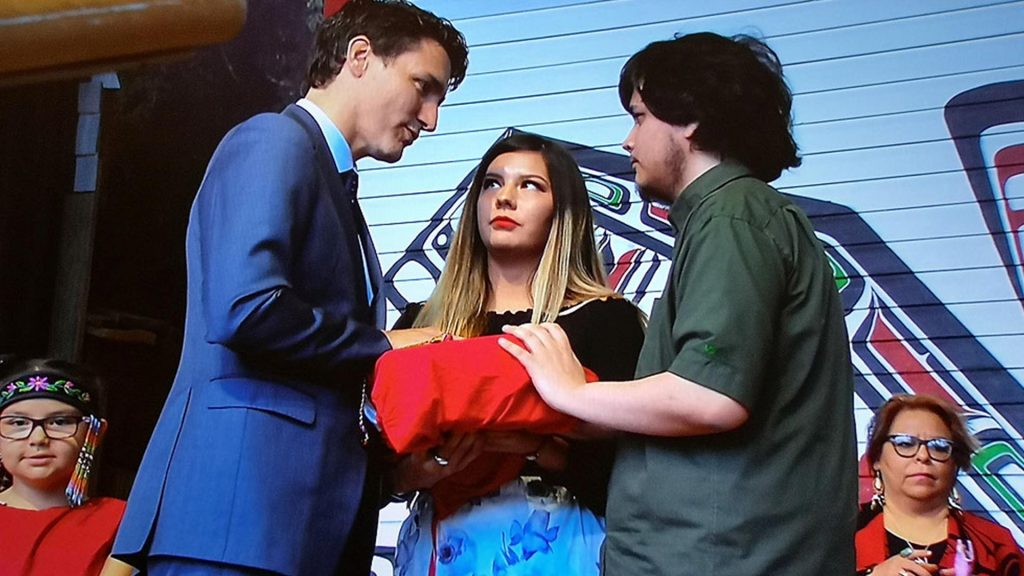
Prime Minister Justin Trudeau accepts the final report of the MMIWG inquiry on June 3, 2019. APTN file
Prime Minister Justin Trudeau issued a statement Wednesday listing his government’s accomplishments in the effort to tackle violence against Indigenous women.
“In the spirit of reconciliation, we are taking steps together to address the important issues identified in the National Inquiry’s report and the Calls for Justice. We passed legislation developed in collaboration with Indigenous partners to help protect their languages and cultures, and co-developed Indigenous child and family services legislation to ensure that Indigenous children remain with their family and community.
“We are providing financial support to communities so they can offer shelters and mental health services for women and children experiencing and escaping violence,” Trudeau said in the statement released Wednesday.
“We extended support to community-based and specialized services that provide assistance to the families of missing and murdered women, girls, and LGBTQ and two-spirit people. We are also working closely with Indigenous peoples and communities to support their efforts to respond to COVID-19 and its health, social, and economic impacts.”
Nowhere in the short statement does Trudeau mention the word genocide – a conclusion the commissioners arrived at after listening to thousands of hours of testimony from victims and survivors.
“Ending this national tragedy through the co-development and implementation of a distinctions-based National Action Plan is an urgent priority for our government, and requires ongoing work with all partners,” said Trudeau.
The statement comes on the heels of a scathing letter issued by Marion Buller, Michele Audette, Bryan Eyolfson and Qajaq Robinson, the former commissioners of the national inquiry, over government’s inaction on the file and which called on families to solicit international help if nothing is done.
“We call on Canada to move past fear and in partnership with Indigenous women, girls and 2S people, engage an international and impartial organization to mediate and oversee the implementation of the Calls for Justice,” their statement said.
“Should Canada fail to do so in a timely manner, we strongly encourage Indigenous women, girls and 2S people to invite international and impartial oversight of the implementation of the Calls for Justice.”
Families and organizations have been issuing statements for the past week chastising the government for its lack of action to consult about a plan to implement the calls for justice and for using the pandemic as an excuse for not releasing a plan on the anniversary as promised by Carolyn Bennett, minister of Crown-Indigenous Relations at last December’s Assembly of First Nations special chiefs assembly.
The Native Women’s Association of Canada (NWAC) said in a release May 27 that it’s “appalled” by the federal government’s lack of a plan to address the issues outlined in the report and a promise from Trudeau that the report wouldn’t be “placed on a shelf to collect dust.”
NWAC accused the government of holding “no consultation with people who matter” and chastised Bennett, in particular, for letting groups and families know through the media there would be a delay.
“Rather than a national action plan, Indigenous women have been given a lack-of-action plan,” said Lorraine Whitman in a release.
“Indigenous women are still dying and disappearing in Canada, families are still being left in the dark about the loss of their loved ones. The time to act is now, not years or even months from now.”
Trudeau said all groups will be needed to get the plan in place.
“The National Inquiry has shown us the way forward. We know that there is still much more to do to end the systemic gender and racial discrimination that continues today,” he said. “As we continue to walk the path of reconciliation, we will listen to the voices of families and survivors, as well as grassroots organizations and Indigenous leaders who work every day to advocate for their communities and keep them safe.
“Everyone has a role to play to end violence and ensure the safety of Indigenous women, girls, and LGBTQ and two-spirit people. Together with families and survivors, First Nations, Inuit, and Métis people, Indigenous organizations, and provincial, territorial, and municipal partners, we will continue work and redouble our efforts to develop a truly National Action Plan to honour those we have lost, help their families heal, and protect current and future generations.”
With files from Kathleen Martens and Jamie Pashagumskum.









